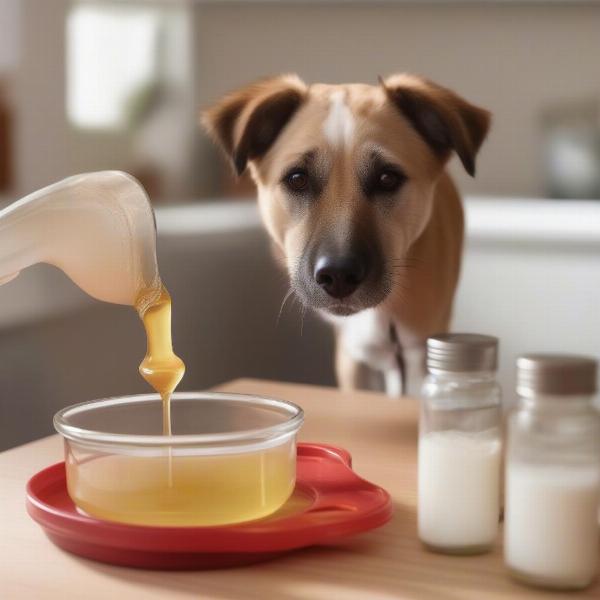Omega-3 and omega-6 fatty acids are essential nutrients for dogs, playing a vital role in maintaining their overall health. While a balanced diet often provides some omega fatty acids, supplementing with omega oil can offer additional benefits for your furry friend, from promoting healthy skin and coat to supporting joint function and cognitive health. This guide will delve into the benefits, usage, and considerations of omega oil for dogs, helping you make informed decisions about your pet’s nutritional needs.
Understanding Omega Fatty Acids for Dogs
Omega-3 and omega-6 are polyunsaturated fatty acids that dogs cannot produce on their own and must obtain through their diet. They contribute to various bodily functions, including cell growth, immune response, and inflammation regulation. A proper balance of these fatty acids is crucial, as an excess of omega-6 can sometimes exacerbate inflammatory conditions. Omega-3 fatty acids, particularly EPA (eicosapentaenoic acid) and DHA (docosahexaenoic acid), are known for their anti-inflammatory properties and are often recommended for dogs with skin allergies, arthritis, and other inflammatory issues.
Benefits of Omega Oil Supplementation
Supplementing your dog’s diet with omega oil can provide numerous benefits:
- Skin and Coat Health: Omega-3s help reduce itching and inflammation associated with allergies and other skin conditions, promoting a healthy, shiny coat.
- Joint Support: Omega-3s have anti-inflammatory effects that can ease joint pain and stiffness, particularly in dogs with arthritis.
- Cognitive Function: DHA is crucial for brain development in puppies and can support cognitive function in older dogs.
- Heart Health: Omega-3s can help regulate heart rhythm and reduce triglyceride levels, contributing to overall cardiovascular health.
- Immune System Support: Omega fatty acids play a role in supporting a healthy immune system, helping your dog fight off infections and diseases.
Choosing the Right Omega Oil for Your Dog
When selecting an omega oil supplement, consider the following factors:
- Source: Fish oil (salmon, cod, krill) and algal oil are common sources of omega-3s for dogs. Algal oil is a vegan option and often preferred for dogs with fish allergies.
- EPA and DHA Content: Look for supplements with clearly labeled EPA and DHA levels, as these are the most beneficial omega-3s for dogs.
- Quality and Purity: Choose high-quality oils that are purified to remove heavy metals and other contaminants.
- Form: Omega oil supplements are available in liquid, capsule, and chewable forms. Choose the form that is easiest to administer to your dog.
Dosage and Administration
Always follow the dosage instructions on the product label. Start with a low dose and gradually increase it as needed. You can mix liquid omega oil with your dog’s food or administer capsules directly. Chewable supplements are often palatable and easy to give as treats.
Potential Side Effects and Precautions
While omega oil is generally safe for dogs, some potential side effects include:
- Fishy Breath: This is a common side effect, especially with fish oil supplements.
- Gastrointestinal Upset: Some dogs may experience diarrhea or vomiting, particularly with high doses.
- Bleeding Issues: Omega-3s can have blood-thinning effects, so consult your veterinarian before giving omega oil to dogs with bleeding disorders or those taking blood-thinning medications.
When to Consult Your Veterinarian
It’s always best to consult your veterinarian before starting your dog on any new supplement, including omega oil. They can help you determine the appropriate dosage and ensure it won’t interact with any existing medications. They can also advise if omega oil is the right supplement for your dog’s specific needs and health conditions.
Conclusion
Omega oil can be a valuable addition to your dog’s diet, offering numerous health benefits. By understanding the different types of omega fatty acids, choosing a high-quality supplement, and administering it correctly, you can help your furry friend thrive. Remember to consult your veterinarian before starting your dog on any new supplement regimen.
FAQs
-
How much omega oil should I give my dog? Always follow the dosage instructions on the product label and consult with your veterinarian for personalized recommendations.
-
Can I give my dog human omega-3 supplements? It’s best to use omega-3 supplements specifically formulated for dogs, as human supplements may contain ingredients that are harmful to pets.
-
What are the signs of omega-3 deficiency in dogs? Signs may include dry, flaky skin, dull coat, excessive shedding, itching, joint pain, and decreased cognitive function.
-
Are there any alternatives to omega oil for dogs? Some dietary sources of omega-3s for dogs include fatty fish (salmon, tuna), flaxseed oil, and chia seeds. However, supplementation may still be necessary to achieve optimal levels.
-
How long does it take to see results from omega oil supplementation? It may take several weeks to several months to see noticeable improvements in your dog’s skin, coat, and overall health.
-
Can omega oil help with my dog’s allergies? Omega-3s can help reduce inflammation associated with allergies, but it’s important to address the underlying cause of the allergy with your veterinarian.
-
Can I give my puppy omega oil? Yes, omega-3s are beneficial for puppy development, especially for brain and eye health. Consult your veterinarian for the appropriate dosage for your puppy’s age and weight.
 Adding Omega Oil to Dog Food
Adding Omega Oil to Dog Food
ILM Dog is a leading international website dedicated to providing expert advice and resources on dog care and wellbeing. We cover a wide range of topics, from breed selection and health to training, nutrition, grooming, and much more. Our mission is to empower dog owners worldwide with the knowledge and tools they need to provide the best possible care for their canine companions. For expert advice on dog health, nutrition, and product recommendations, contact us at [email protected] or +44 20-3965-8624. Learn more and explore our comprehensive resources at ILM Dog.